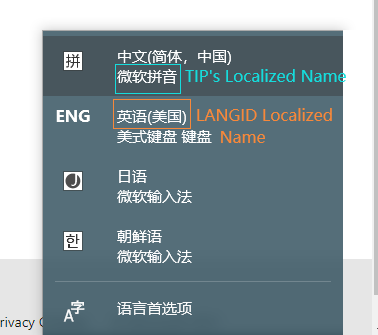To obtain the localized name of the text service use ITfInputProcessorProfiles::GetLanguageProfileDescription
https://learn.microsoft.com/en-us/windows/win32/api/msctf/nf-msctf-itfinputprocessorprofiles-getlanguageprofiledescription
To obtain the localized name of the keyboard layout, see the code below.
To obtain the localized name of the LANGID, see the code below.
[TSF-Application]How to obtain the localized name of the text service (TIP)

Windmill_City
206
Reputation points

Accepted answer
-
 Windmill_City 206 Reputation points
Windmill_City 206 Reputation points2021-08-14T03:38:29.543+00:00
1 additional answer
Sort by: Most helpful
-
 Windmill_City 206 Reputation points
Windmill_City 206 Reputation points2021-08-14T06:56:36.733+00:00 /** * @brief Get the locale of the input processor * * @param BSTR* Pointer to a BSTR value that receives the locale string. The caller is responsible for freeing * this memory using SysFreeString when it is no longer required. */ HRESULT libtf_get_input_processor_locale(libtf_InputProcessorProfile_t profile, BSTR* locale) { LCID lcid = MAKELCID(profile.langid, SORT_DEFAULT); wchar_t buf[85]; GetLocaleInfoW(lcid, LOCALE_SNAME, buf, 85); *locale = SysAllocString(buf); return S_OK; } /** * @brief Get the localized name of the locale * * @param BSTR locale * @param BSTR* Pointer to a BSTR value that receives the name string. The caller is responsible for freeing * this memory using SysFreeString when it is no longer required. */ HRESULT libtf_get_locale_name(BSTR locale, BSTR* name) { wchar_t buf[128]; GetLocaleInfoEx(locale, LOCALE_SLOCALIZEDDISPLAYNAME, buf, 128); *name = SysAllocString(buf); return S_OK; } /** * @brief Get the localized name of the input processor * * @param BSTR Pointer to a BSTR value that receives the description string. The caller is responsible for freeing this * memory using SysFreeString when it is no longer required. */ HRESULT libtf_get_input_processor_desc(libtf_InputProcessorProfile_t profile, BSTR* desc) { switch (profile.dwProfileType) { case TF_PROFILETYPE_INPUTPROCESSOR: { CComPtr<ITfInputProcessorProfiles> inputProcessorProfiles; CHECK_HR(createInputProcessorProfiles(&inputProcessorProfiles)); CHECK_HR(inputProcessorProfiles->GetLanguageProfileDescription( profile.clsid, profile.langid, profile.guidProfile, desc)); } break; case TF_PROFILETYPE_KEYBOARDLAYOUT: { HKEY layouts; CHECK_ES(RegOpenKeyEx(HKEY_LOCAL_MACHINE, TEXT("SYSTEM\\CurrentControlSet\\Control\\Keyboard Layouts"), 0, KEY_READ, &layouts)); HRESULT hr; // the key of the keyboard layout is its langid char layoutKey[9]; snprintf(layoutKey, 9, "%08x", profile.langid); HKEY layout; if (NOT_ES(hr = RegOpenKeyExA(layouts, layoutKey, 0, KEY_READ, &layout))) goto CloseParentKey; DWORD size; // Get data size first if (NOT_ES( hr = RegGetValueW( layout, NULL, L"Layout Display Name", RRF_RT_REG_EXPAND_SZ | RRF_NOEXPAND, NULL, NULL, &size))) goto CloseSubKey; { std::unique_ptr<uint8_t[]> buf(new uint8_t[size]); // Get resource key of the name if (NOT_ES(hr = RegGetValueW(layout, NULL, L"Layout Display Name", RRF_RT_REG_EXPAND_SZ | RRF_NOEXPAND, NULL, buf.get(), &size))) goto CloseSubKey; // Get the layout name by resource key std::unique_ptr<wchar_t[]> layoutName(new wchar_t[KL_NAMELENGTH]); if (FAILED(hr = SHLoadIndirectString((wchar_t*)buf.get(), layoutName.get(), KL_NAMELENGTH, NULL))) goto CloseSubKey; // Return result *desc = SysAllocString(layoutName.get()); CHECK_OOM(*desc); } CloseSubKey: RegCloseKey(layout); CloseParentKey: RegCloseKey(layouts); return hr; } break; default: return E_INVALIDARG; } return S_OK; }
